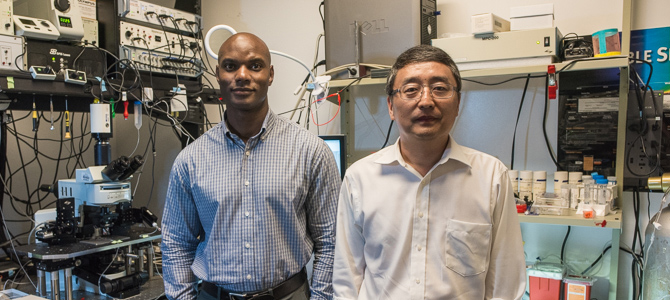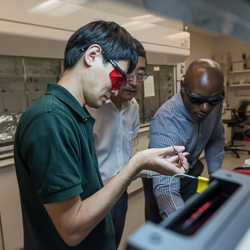
Researchers Awarded Highly Competitive NIH Grant

Researchers at the University of Arizona College of Medicine – Phoenix have received a highly competitive grant for their efforts to address the basic neural circuit mechanisms of depression.
 Principal investigators Shenfeng Qiu, PhD, and Deveroux Ferguson, PhD, and postdoctoral fellows Jing Wei, PhD, and Hee-Dae Kim, PhD, in the Department of Basic Medical Sciences at the College, were recently awarded a two-year, National Institutes of Health R21 project for $422,125.
Principal investigators Shenfeng Qiu, PhD, and Deveroux Ferguson, PhD, and postdoctoral fellows Jing Wei, PhD, and Hee-Dae Kim, PhD, in the Department of Basic Medical Sciences at the College, were recently awarded a two-year, National Institutes of Health R21 project for $422,125.
“This grant will enable new lines of cutting-edge research in Phoenix, further strengthen the existing neuroscience research expertise at the College of Medicine – Phoenix, enhance the overall research profiles of our fledging medical school and bring additional long-term research funding in the near future,” Dr. Qiu said.
R21 grants are intended to encourage exploratory and developmental research by providing support for the early and conceptual stages of project development. This is the first new R21 awarded to the department, which will set the groundwork for larger R01 funding applications.
The researchers propose to study the neural circuit mechanisms of major depressive disorders, which affect about 10 percent of Americans. They will use novel mouse models in which neurons activated by social defeat stress are genetically labeled by fluorescent proteins to investigate how synaptic and circuit connectivity are altered by stress.
“This grant will allow us to use cutting-edge techniques, such as optogenetics, to probe neural circuits underlying major mood disorders,” Dr. Ferguson said. “Our work will utilize paradigm-shifting practices in precise, circuit-based therapeutics aimed at restoring prefrontal synaptic homeostasis.”
 The research findings could reveal a paradigm-shifting practice in circuit-based therapeutics aimed at restoring normal brain circuit function to treat major depressive disorders, according to Dr. Qiu.
The research findings could reveal a paradigm-shifting practice in circuit-based therapeutics aimed at restoring normal brain circuit function to treat major depressive disorders, according to Dr. Qiu.
“This grant showcases the strength of neuroscience on the College of Medicine – Phoenix campus, and how two junior investigators combine complimentary resources and expertise to tackle the most challenging neuroscience questions and succeed in today’s most competitive environment for NIH funding,” Dr. Qiu said.
About the College
Founded in 2007, the University of Arizona College of Medicine – Phoenix inspires and trains exemplary physicians, scientists and leaders to advance its core missions in education, research, clinical care and service to communities across Arizona. The college’s strength lies in our collaborations and partnerships with clinical affiliates, community organizations and industry sponsors. With our primary affiliate, Banner Health, we are recognized as the premier academic medical center in Phoenix. As an anchor institution of the Phoenix Bioscience Core, the college is home to signature research programs in neurosciences, cardiopulmonary diseases, immunology, informatics and metabolism. These focus areas uniquely position us to drive biomedical research and bolster economic development in the region.
As an urban institution with strong roots in rural and tribal health, the college has graduated more than 1,000 physicians and matriculates 130 students each year. Greater than 60% of matriculating students are from Arizona and many continue training at our GME sponsored residency programs, ultimately pursuing local academic and community-based opportunities. While our traditional four-year program continues to thrive, we will launch our recently approved accelerated three-year medical student curriculum with exclusive focus on primary care. This program is designed to further enhance workforce retention needs across Arizona.
The college has embarked on our strategic plan for 2025 to 2030. Learn more.